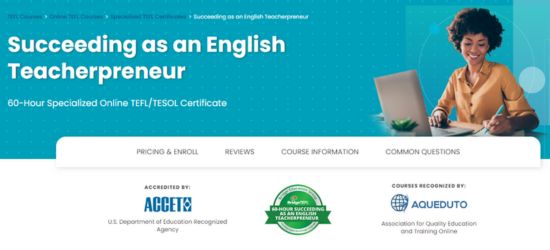A new day breaks and online English teacher Andrea Beatriz Collados settles in at her desk in her home in Buenos Aires, Argentina to start a new day of teaching. With more than 20 years of experience, Collados has taught students of all ages on five different continents. Her teaching practice focuses on teaching English as a global language with an emphasis on inclusivity and creativity in the online classroom space. She works primarily with adults, teaching them Business English, and preparing them for success in a global marketplace.
Some of her students are studying to pass an English language proficiency exam, while others are working toward goals of transfers or climbing the ladder in their companies. Like many independent English teachers, Collados transitioned from a traditional, in-person classroom to an online one in recent years. She loves to travel and the shift to digital instruction gave her the ability to continue teaching while traveling the world. She is one of a new breed of TEFL instructors: the digital nomad online English teacher.
Learn how to teach English online as a digital nomad.

The changing landscape of teaching abroad
From the rapid evolution of technology to the world-shifting pandemic of 2020, the TEFL industry has seen many shifts during the last decade. Among these changes is the evolving format of teaching abroad. While there are still many opportunities to teach abroad in the traditional way – traveling to a country and teaching in a classroom – much of that industry has moved to the digital space, providing room for digital nomads to pursue their dual passions of teaching English and traveling.
The term digital nomad became popularized in the book The Digital Nomad, by Tsugio Makimoto and David Manners. The authors suggested new technology would allow people to return to their nomadic state, as global digital communication tools empower employees to work from anywhere.
Nearly 20 years later, many language teachers are in fact pursuing this dream, traveling the globe and teaching remotely. Collados is just one example of many. While there are certainly challenges in the English teacher digital nomad lifestyle and profession, there are also many rewards. With the right training, resources and support, this community of intrepid teacherpreneurs is able to maintain a rewarding teaching career while traveling the world, meeting new people, trying new foods and discovering new cultures.
The English teacher digital nomad wears many hats, as earning a living teaching online requires online teaching, business and marketing skills. Whether working for a language school, tutoring with a marketplace or embracing teacherpreneurship with an independent business, this entrepreneurial community is embracing the empowering digital nomad teacher lifestyle.
Find out how to stand out on teacher marketplace platforms.
A fast-track to online learning and innovation
The biggest recent shift in the TEFL industry occurred as a direct result of the COVID-19 pandemic. As lockdowns swept the globe, teaching institutions of all kinds closed their doors. Education couldn’t be put on hold indefinitely, and so a host of online service providers and internet-based learning options arose. From disruption rises innovation, and we soon saw fast-track innovations in EdTech. From this, the digital nomad lifestyle was born.
In its infancy, digital nomads were essentially working from home. International travel was restricted, but clients needing English instruction were flocking to online sites such as EdTech to meet their educational learning requirements. From kindergarten groups to IT professionals, the demand for teachers steadily rose.
Like other language schools, Bridge shifted to online instruction as well, transitioning brick-and-mortar courses to an online platform. The transition was not easy – as many institutions faced the challenges of an almost instantaneous transition to remote instruction – but the potential inherent in online instruction for an industry that provides services to a global audience quickly became clear. Bridge already utilized state-of-the-art technology in courses, understanding the critical need to maximize resources and prepare students with 21st-century skills of digital literacy, critical thinking and more.
This time period became a critical juncture for the language company, and the mission transitioned to providing training for teachers in an online format. While training continued to prepare teachers for the classroom, in person or online, coursework also expanded to prepare teachers for teaching as digital nomads. Today, Bridge offers a suite of Teaching English Online courses, as well as other professional development resources such as eBooks, Expert Series webinars and articles.

Learn about typical TEFL salaries when teaching online or abroad.
Rise of the digital nomad lifestyle
As borders began to open and travel picked back up, online English teachers also saw the unique opportunities that arose from their online teaching experiences. No longer were they bound by an office, classroom or strict teaching schedule. They could be in control of their careers. By the scores, teachers of every age, experience level and background began to spread across the globe. Soon teaching hot spots began to develop, areas that were a perfect balance of affordability, adventure and opportunity, all possible with WiFi access and the right equipment.
These new pioneers of digital teaching saw both successes and challenges. Teachers found they needed to be resourceful and creative. They also needed to be incredibly adaptive to meet the needs of students with different backgrounds and cultures, and who hailed from different time zones. Teachers saw struggles with internet capabilities for both themselves and their students and with payment logistics.
EdTech creators also recognized these challenges and a wealth of new technologies arose to support online teaching, including substantial growth in free and subscription-based learning platforms.
Learn about some of the best digital tools for teaching English online.
The convergence of teaching and digital nomadism
The sudden surge in online learning spaces revolutionized the way English was taught and learned around the world. Now students are able to connect with teachers across time zones, with specializations, in private tutoring sessions, and for affordable rates. Teachers became able to market themselves, creating their own businesses as online teacherpreneurs.
EdTech companies began fast-tracking innovations that included learning platforms with video conferencing, a variety of teaching tool integrations, and – a boon for digital nomad teachers – integrated marketing, scheduling and payment tools.
I had the opportunity to teach English to people from diverse ethnic backgrounds such as Catalan, French, Spanish and Portuguese.
For language schools training teachers, these changes created the need for teacher training in online teaching, technology in the online classroom and much more.
These advances in the English language teaching industry not only changed the perception of schooling but also created opportunities for more expansion in private-sector language companies. The industry has seen remarkable growth in online tutoring marketplaces and online language schools.
Collados was an early adopter of the digital nomad lifestyle. “I had the opportunity to teach English to people from diverse ethnic backgrounds such as Catalan, French, Spanish and Portuguese,” she said. “This experience was absolutely beneficial on a personal as well as professional level because it contributed to the development of flexibility to adapt and the acceptance of diversity.”

Read about the ways English tutor marketplaces are continuing to evolve.
The benefits of the digital nomad lifestyle
One great benefit of the digital nomad lifestyle is embracing new cultures, Collados said, pointing out that learning about students’ cultures and backgrounds improves communication and builds rapport.
While public school teachers were dealing with burnout and layoffs, digital nomad online English techers were chasing opportunity.
But Collados suggests the greatest advantage is the flexibility and comfortability of working from home or from anywhere else,” Collados said. “There’s a famous quote that says, ‘If you don’t like where you are, move. You are not a tree.’ And I completely ascribe to that. It is human nature to explore, discover and connect.”
She also pointed out the benefit of minimized cost of living and a healthy work-life balance that is rarely achieved in the traditional teaching sphere. “While public school teachers were dealing with burnout and layoffs, digital nomad online English teachers were chasing opportunity,” she said.
Beyond the traditional format of teaching for an employer or as a freelancer, innovations in technology and the shifting needs of students have also created space for private tutoring and private online teaching businesses. Many teacherpreneurs are combining these opportunities to build their own businesses, starting small with private tutoring and eventually expanding to businesses with multiple employees, marketing services and expanding student populations.
I wanted to have the freedom to travel for as long as I wanted without having to ask for permission.
Head Instructor of Bridge Teacherpreneur Academy and the Specialized Certificate Succeeding as an English Teacherpreneur course, Rachel Story is an experienced teacherpreneur with an online teaching business and travel blog. Years ago, she was teaching abroad in China, but she saw an opportunity for something more as the online language learning market began to grow.
“I love to travel and immerse myself in other cultures,” she said. “I got a taste for travel when I was teaching English in China, but I could never stay in one place for very long. I wanted to have the freedom to travel for as long as I wanted without having to ask for permission.”
Story is now a digital nomad, running her online teaching business and blogging about her experiences. When asked what she most enjoys about being a digital nomad, she said, “In a single word – freedom.”
Becoming a teacherpreneur requires business, marketing, and ELT industry know-how.
Story’s passion for teaching and traveling led to her partnership with Bridge. She has shared her digital nomad experiences and advice as a panelist in several Expert Series webinars and collaborated in the creation of the Succeeding as an English Teacherpreneur course and Teacherpreneur Academy. The Academy, designed to provide training, resources and support for teachers building independent online teaching businesses, includes the Specialized Certification course, along with an exclusive platform for resource sharing, continuous learning, access to expert-led webinars and engagement with a global teacherpreneur community. As Head Instructor for the Academy, she will work one-on-one with teachers as they learn the critical skills needed to transition from employee to business owner.
For those independent online teachers dreaming of travel, the Academy also provides a pathway to make that dream a reality.
“Becoming a teacherpreneur requires business, marketing and ELT industry know-how,” Story said. “With the right skills and planning, you can build a successful and rewarding career as a teacherpreneur. [In the course] there’s a lesson devoted to everything you need to know to prepare for a digital nomad career including the challenges and potential pitfalls.”

Overcoming the challenges of the digital nomad lifestyle
While there are many benefits of being a digital nomad English teacher, there are, of course, some challenges. Digital nomads have students all over the world, many in different time zones, they rely on technology to teach their courses, they may be traveling while teaching courses and they may sometimes be in new, unfamiliar locations.
My advice is to find digital nomad communities and make friends. You can do this through online groups, joining co-working/co-living spaces and attending events for digital nomads (in person or online).
Before embarking on a career as a digital nomad, it’s important to ask yourself these questions:
-
Why do you want to be a digital nomad?
-
Do I have the discipline to adhere to a teaching schedule in my own home?
-
What age group would I like to teach? What challenges may arise from online teaching within that group?
-
What is my teaching niche?
-
Do I function best with a close network of teachers and support staff who can help me during the school week?
-
What is my required baseline salary?
-
Are there any limiting factors to my success as an online or traditional teacher?
“One of the biggest challenges [of being a digital nomad] is dealing with loneliness and lack of community,” Story said. “My advice is to find digital nomad communities and make friends. You can do this through online groups, joining co-working/co-living spaces and attending events for digital nomads (in person or online).”
The online platform of the Teacherpreneur Academy was created for this very purpose. With a range of experienced digital nomads and budding teacherpreneurs, members can access a global community of teachers for support, a listening ear, teaching resources and more, at any time of the day. Finding community, resources and opportunities for continued professional development is crucial for digital nomad teacher success.
Transitioning to a digital nomad lifestyle requires planning and determination, as well as the ability to embrace change. Many teachers initially work with an online tutoring marketplace or online language school to find students and build their clientele before shifting fully to independent teaching or starting their own business. Many teachers working with Bridge as corporate language trainers are digital nomads. The list below highlights some of the typical challenges of digital nomads, such as:
Whether you choose to work with a tutoring marketplace, a language school, or a combination of both or choose to start an independent tutoring or teaching business, there are still many things to consider. A broad overview of these considerations may include:
-
TEFL/TESOL certifications that meet requirements
-
online teaching experience
-
online teaching training
-
understanding your financial needs
-
identifying the proper equipment
-
internet connection capabilities
-
time zones and scheduling needs.
-
pay options, currency exchanges, and banking needs
While some of these considerations mirror research that would be conducted for traditional teaching abroad, others have changed with the shift to digital nomad online teaching, as technology dependence is new. Digital nomad teachers must also consider the preparations needed for teaching students online.

Tips for a successful transition
Collados has taught both in person and online in numerous schools and businesses, with classes of children, teens and adult business professionals.
“Face-to-face interaction and the human touch are essential in the education field,” she said. When academic activity happens online, the platform of your choice should include all kinds of scenarios that you used to have in the physical classroom, such as presentations, group discussions, homework, assignments and exams.”
There are many advantages to taking a balanced approach, the optimization of time being the most relevant one.
Making the shift to an online classroom means needing to be resourceful and creative in finding ways to adapt the core elements of learning to an online space. Today’s educators have access to a massive market of digital products, ranging from ready-made, interactive lesson plans to games and activities for students.
Collados pointed out that the best results come from blending synchronous and asynchronous learning, which can be done with digital resources that allow teachers to make the most of classroom time. “There are many advantages to taking a balanced approach, the optimization of time being the most relevant one,” she said. “This hybrid model allows students to practice reading and writing and come to terms with difficult concepts.”
While digital resources are fantastic tools, effective use comes with identifying effective ESL teaching methodologies that fit the context of students’ ages, learning styles and purpose of learning.
There is no one-size-fits all one-size-fits-all teaching methodology and as an online teacher of students from all over the world, there are many factors to consider. A successful digital nomad teacher will need to be equipped with the knowledge of effective methodologies, student needs assessments and more to ensure instructional methods will meet the needs of all students.

Getting expert guidance to launch your digital nomad career
While there are many blogs, videos, and other resources with advice for making the shift to the digital nomad lifestyle, expert training and resources will ensure you’re well prepared. Bridge has been providing TEFL/TESOL Certifications and Micro-credentials for over four decades and has many resources, including the downloadable ebook The Teacherpreneur Playbook: How to Build and Manage Your Own Student Portfolio for the online teacherpreneur.
Bridge’s Teacherpreneur Academy goes beyond conventional professional development to empower educators to be successful independent instructors. The Academy includes the Succeeding as an English Teacherpreneur course but also includes a robust platform dedicated to resource sharing, continuous learning and direct engagement with expert-led webinars and workshops. Teaching abroad as a digital nomad requires skills and knowledge of teacherpreneurship, and access to the platform will equip teachers with what they need to succeed.
Get an insider’s school with “Things I Wish I Had Known” from a digital nomad teacher.
The future of teaching English abroad as a digital nomad
Statistics from the Global Mobile Workforce Forecast indicate a steady continual rise in digital nomads around the world heading into 2024. Nearly 2 billion professionals worldwide are currently remote workers, proving that an office environment isn’t necessary for engagement and growth. For the digital nomad online English teacher, this means a growing pool of job opportunities, but also an expected rise in competition as well.
Global educators who have previously moved from country to country had to reinvent themselves, reflect on their role as teachers, adapt to the demands of virtual classrooms and develop new skills required for the ever-changing global context.
As cost of living and inflation continue to rise this year, people are taking their remote jobs and hitting the road for more affordable pastures. In June 2023 alone, more than 50,000 public school teachers left their jobs in the traditional classroom. Competition will continue to grow in the lucrative and flexible field of online teaching. The best way to ensure success? Keep learning. New credentials, certificates, and specializations will keep you in demand throughout the year.
No two teachers can provide the exact same learning experience, Collados said. Being adaptable and engaging in continued professional growth are essential for digital nomad teachers,
“Global educators who have previously moved from country to country had to reinvent themselves, reflect on their role as teachers, adapt to the demands of virtual classrooms and develop new skills required for the ever-changing global context,” she said. These experiences are invaluable, providing skills and credentials that will stand out among the competition.










